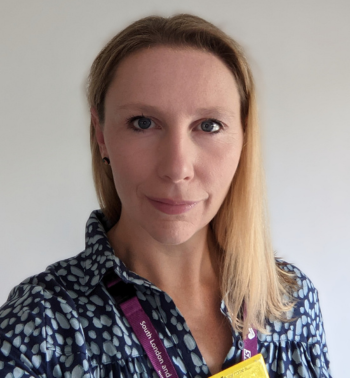15 August 2024
The clinical specialist physiotherapist explains that "FND is as common as Parkinson’s disease, multiple sclerosis and just like any other condition, when it is more widely understood more staff are able to deliver appropriate treatment".
What is your role?
I am the clinical specialist physiotherapist within the neuropsychiatry team at South London and Maudsley NHS Foundation Trust. My caseload is patients with Functional Neurological Disorder (FND) and I assess and treat patients in an outpatient setting. I also support the wider neuropsychiatry team and the physiotherapy team as part of the FiND Programme (our day treatment programme) and the Lishman Unit (our inpatient programme). Through my work I support the wider King’s Health Partners team to treat patients with FND.
Many people haven’t heard of FND, but it is one of the most common conditions seen in neurology outpatient clinics. Many different services will see patients who present with FND symptoms.
Functional Neurological Disorder (FND) is a problem with the functioning of the nervous system and how the brain and body sends and receives signals. It’s an area where there is an increasing understanding of how physical and/or psychological risk factors can cause functional symptoms - which include a variety of physical, sensory and cognitive symptoms.
As a physiotherapist I treat people whose symptoms include functional motor/movement symptoms - this may include problems with tremor, balance, walking or arm function.
What do you enjoy most about your role?
I enjoy the variety of the work and my interactions with patients. Being able to have a positive impact on a patient’s symptoms with treatment and providing them with guidance to put strategies into practice outside of our sessions, so they can return to the activities they enjoy, that is something I find truly rewarding.
The interface between neuropsychiatry and neurology is an interesting area. Working in a Multi-Disciplinary Team with both neurologist, neuropsychiatrist, psychologists and other allied health professions, it’s great to see the shift in understanding and how possible treatment interventions are developing.
What inspired you to get into this work?
I worked at King’s College Hospital NHS Foundation Trust for over 18 years in various areas and I saw patients with FND across many of the different services. However, when I became involved in a multicentre randomised control trial, offering a specialist intervention for people with FND in 2018, my interest in helping FND patients grew. So when the role at South London and Maudsley NHS FT came up in 2020 I couldn’t wait to get started.
What are the benefits of working in partnership?
FND is as common as Parkinson’s disease, multiple sclerosis and just like any other condition, when it is more widely understood more staff are able to deliver appropriate treatment and we can avoid iatrogenic harm. Working in partnership across the King’s Health Partners and making links is one way of doing this. As part of this we offer an annual FND masterclass where King’s Health Partners staff can attend (for free) to learn more about FND. This also provides an opportunity for staff to network and build relationships across the partnership.
My aim is to increase awareness of FND within the physiotherapy team, so all members of physiotherapy feel confident in discussing an FND diagnosis, offering appropriate treatment and signposting or referring to additional support as and when it’s needed. Part of this has been by developing a rotational post where physiotherapy staff rotate from King’s College Hospital NHS FT to South London and Maudsley NHS FT to increase their experience of treating those with FND. The success of the new role meant it was replicated within occupational therapy.
What would be your one career top tip?
Try new things and get involved. There is so much overlap between areas and the skills you learn in one area may be just as valuable in another. We are all going to be working for a long time, so careers don’t need to follow a ‘typical trajectory’ if you find something you are interested in give it a go.





